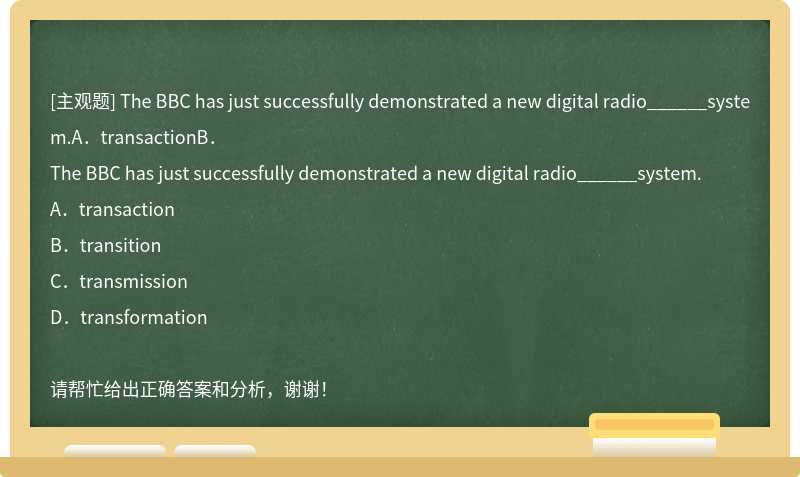SECTION BINTERVIEWDirections: In this section you will hear everything ONCE ONLY. Listen c
SECTION B INTERVIEW
Directions: In this section you will hear everything ONCE ONLY. Listen carefully and then answer the questions that follow. Questions 1 to 5 are based on an interview. At the end of the interview you will be given 10 seconds to answer each of the following five questions.
Now listen to the interview.
听力原文:M: You are not still watching television, are you?
W: I enjoy your television -- I'll have to watch lots more while I' m here. The camera-work was good. It looked like the work of real experts. Er... how long has television been going in Britain?
M: Oh, since 1936.
W: Ah!
M: Only in the London are at that time, though. There wasn't any television during the Second World War. It was started up again afterwards. The BBC was the organization responsible for it.
W: What do the initials BBC stand for?
M: British Broadcasting Corporation. It's a public corporation. It isn't controlled by the government, but it's not a private company either. That means that the government can’t use the BBC for propaganda purposes, and nor can private individuals or firms.
W: Is there any advertising?
M: Not on the BBC. ITV gets its money from advertising, though.
W: ITV?
M: ITV stands for Independent Television. It was started in 1954 -- again in the London area. It covers the whole country now, though.
W: Why does everything start in London?
M: Well... it's the capital after all -- and the largest center of population by a long way. If you start up a public serv- ice.., like TV... there, it gets to as many people as possible to start with.
W: What do people think of advertisements on television?
M: It depends. A lot of people think it is a good idea because it means that television can pay its way — the ITV gets all the money from the advertisements
W: What about the BBC?
M: You have to pay a TV license of 7 pounds a year-- that goes to the BBC. Or 12 pounds for color. A lot of people don'
t like to pay and wish that there were advertisements on the BBC too. On the other hand, other people hate TV advertising because they think it is an insult to their intelligence.
W: Mm. The advertisements aren't very subtle, then?
M: well ..... some aren't, anyway. Lots of people go out to the kitchen to make a cup of tea when the adverts are on... or take their dog for a walk.
W: How many channels are there?
M: Three. The: BBC has two. ITV has only got one. ITV doesn't think that's fair. They want another channel to make them equal with the BBC, but so far the government hasn't allowed them to have one. The BBC say that if there's to he another channel, then they should have it, not ITV. The BBC think the fourth channel should be used for the Open University.
W: The Open University?
M. Oh, you must have heard about the Open University. It is a university for people who've never been to university and want a chance to go. The university uses BBC television for its lectures. They're on the radio too.
W: I see. What do you think of your television programs?
M: Well, there are some pretty awful programs on TV, hut most are quite good.
W: What sort of things do you watch yourself?
M: I Watch mainly news programs. And I Like old films too.
W:: Old films? If you watch old films, you might just as well go to the cinema.
M: Oh -- not on your life, the cinema costs money. Besides, it's a lot more troublesome going out than staying ? home. And I like old films, not new ones. There are a lot of people like me too. Cinemas all over the places are being closed down all the while because of TV.
W: Mm, reasonable enough, I suppose.
M: And it's not just films that people would rather watch on TV. Fewer people go to football matches nowadays, for in- stance. They prefer to watch them on TV.
W: Surely it's not as good on television as it is in real life?
M: Oh, you lose a bit of the atmosphere, of course, and.., you don't feel part of the occ
A.The initials BBC stand for British Broadcasting Corporation.
B.It’s a public corporation.
C.The government can’t control it.
D.There are some advertising on it.
 题目内容
(请给出正确答案)
题目内容
(请给出正确答案)


 简答题官方参考答案
(由简答题聘请的专业题库老师提供的解答)
简答题官方参考答案
(由简答题聘请的专业题库老师提供的解答)






























